12 Leading FinTech Angel Investors You Should Know
Finding the right angel investor is a critical step. Our list of 12 active FinTech investors can help you identify potential partners for your next round.
Rho Editorial Team

- FinTech angel investor funding provides startups with crucial early-stage capital and access to valuable industry expertise and networks.
- The FinTech sector has attracted many angel investors, with notable backers like John Locke, Daniel Cohen, Christopher Dean, and Peter Levine supporting various startups.
- If you’re raising or have just closed a round, Rho’s platform can help you manage your new capital with FDIC-insured accounts, corporate cards offering up to 2% cashback, automated bill pay, spend controls, and real-time accounting integrations.
For founders in financial technology, securing early capital is a critical step. Understanding who the key angel investors are can give you a significant advantage when you begin to fundraise.
Unlike venture capital firms, angel investors typically invest their personal funds and can offer direct mentorship. This often leads to a different kind of partnership for your startup.
To help you prepare, we've curated this overview of some of the top angel investors in FinTech. Use this guide to learn about individuals who could be a good fit for your company.
Just raised or about to? Set up your financial stack with Rho in minutes. Rho provides business banking, corporate cards, and accounting integrations—built for startup teams moving fast.
Top FinTech Angel Investors By Stage
Many FinTech angel investors choose to invest during the pre-seed and seed stages, where their contributions can have a substantial impact. Identifying who these individuals are will help you target your fundraising efforts more precisely.
Pre-seed Angel Investors in FinTech
The pre-seed stage is the earliest phase of funding, often used to validate an initial idea before a full product exists. For this very early stage, you might look into investors like Christopher Dean and Steve Case, who have shown interest in nascent companies.
Seed Stage Angel Investors in FinTech
Seed funding is typically the first official equity round, intended to help a startup find product-market fit and begin generating revenue. Some notable FinTech investors at the seed stage include Alfred Lin, Anton Levy, and Mike Volpi.
Series A Angel Investors in FinTech
Series A funding is for startups with a proven track record that need capital to scale their user base and product offerings. Investors like Daniel Cohen, Peter Levine, and Matt Murphy are known to participate in Series A rounds for FinTech companies.
Series B Angel Investors in FinTech
Companies pursue Series B funding to expand their market reach and build out their teams, moving from development to the next level of business growth. For this stage, consider approaching investors such as William Ford, Patrick Grady, and Ryan Sweeney.
It's also worth noting that many investors are flexible and participate in multiple funding rounds. Their involvement can span from a company's initial seed funding all the way through to later growth stages.
To help you find the right fit, we've gathered information on leading angel investors in the FinTech industry. The following profiles include details on their investment stages, primary sectors, location, and what makes them a valuable connection for founders.
1. John Locke

John Locke is a partner at Accel, a venture capital firm where he concentrates on high-growth companies. His investment portfolio includes businesses in FinTech, SaaS, and cloud infrastructure.
He has a clear interest in companies that are ready to scale, often participating in Series A and B rounds. His involvement with companies like Galileo Financial Technologies and Socure points to a focus on businesses with strong product foundations and significant market potential.
Founders with established traction in the FinTech or SaaS sectors who are preparing for a substantial funding round may find a good partner in Locke. He appears to be a match for teams looking for capital to accelerate growth and expand their market presence.
- Investment stages: Seed, Series A, Series B
- Industries of focus: FinTech, SaaS, Cloud Infrastructure, Consumer Internet
- Geographical presence: San Francisco Bay Area
- Ideal investment range: $15.0M - $70.0M
- Notable portfolio companies: Galileo Financial Technologies, Socure, SeatGeek, The Zebra
You can find more information about John Locke on the Accel website or his LinkedIn profile.
2. Daniel Cohen
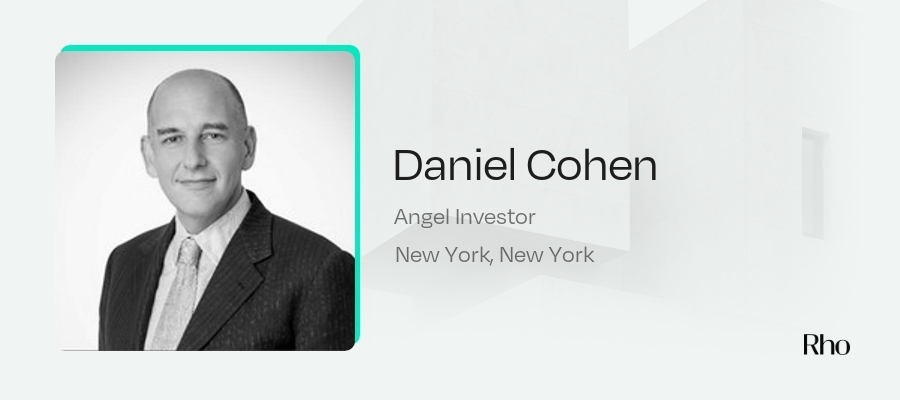
Daniel Cohen is a prominent investor in the financial technology sector and serves as Chairman of FinTech Masala. He is recognized for his activity in both the FinTech and insurance industries.
Cohen primarily concentrates on Series A rounds, with an investment sweet spot around $1.5M. His portfolio includes companies like Curve and ClickSWITCH, showing his interest in businesses that are ready to scale, though he may also participate in later rounds.
Founders with a FinTech or insurance startup seeking Series A capital could find a good match in Cohen. His defined investment range makes him a suitable partner for teams that have a clear funding target for their growth phase.
- Investment stages: Series A
- Industries of focus: Insurance, FinTech
- Geographical presence: New York, New York
- Ideal investment range: $100K - $5.0M
- Notable portfolio companies: Curve, ClickSWITCH
You can find more information about Daniel Cohen on his firm's website or his LinkedIn profile.
3. Christopher Dean

Christopher Dean is a managing director at Summit Partners, a growth equity firm. He tends to invest in companies that are poised for significant expansion across a variety of technology and healthcare sectors.
His portfolio shows a broad interest in areas like FinTech, e-commerce, and digital health, with investments in companies such as Celcoin and Brooklinen. He often participates in Seed and Series B rounds, with a typical investment sweet spot around $20M, suggesting a focus on companies with demonstrated traction.
Founders with a proven business model in one of his key sectors who are seeking substantial capital for growth may find him to be a good fit. His involvement suggests a preference for companies that are ready to scale their operations and market presence.
- Investment stages: Seed, Series B
- Industries of focus: FinTech, E-commerce, Digital Health, BioTech
- Geographical presence: Boston, Massachusetts
- Ideal investment range: $5.0M - $50.0M
- Notable portfolio companies: Celcoin, ShipMonk, Brooklinen
You can find more information about Christopher Dean on the Summit Partners website or his LinkedIn profile.
4. Peter Levine
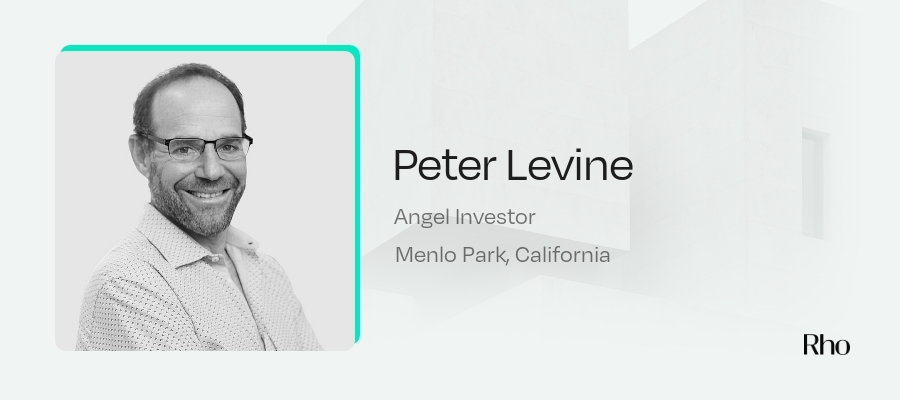
Peter Levine is a general partner at Andreessen Horowitz (a16z), where he focuses on a range of technology sectors. He is known for investing in companies with strong technical foundations, particularly in cloud infrastructure, enterprise software, and AI.
Levine demonstrates versatility by investing across multiple stages, from seed to Series B, with a typical investment sweet spot around $8.0M. His portfolio includes high-growth companies like Figma and Pinecone, signaling an interest in businesses with significant scaling potential and product-centric models.
Founders with a technically complex product in areas like enterprise software, AI, or data services may find a good partner in Levine. He appears to be a match for teams seeking capital and expertise to navigate substantial growth phases.
- Investment stages: Seed, Series A, Series B
- Industries of focus: Cloud Infrastructure, FinTech, Enterprise, AI, Data Services
- Geographical presence: Menlo Park, California
- Ideal investment range: $50K - $50.0M
- Notable portfolio companies: Figma, Pinecone, Netlify, Labelbox
You can find more information about Peter Levine on the Andreessen Horowitz website or his LinkedIn profile.
5. Matt Murphy

Matt Murphy is a partner at Menlo Ventures, where he invests across several technology sectors. His focus includes FinTech, SaaS, and AI, indicating an interest in companies building foundational enterprise software.
Murphy is versatile in his investment stages, participating in rounds from Seed to Series B. His portfolio, featuring companies like Harness and Envoy, suggests a focus on businesses with strong technical products and significant scaling opportunities.
Founders with a product-led company in sectors like enterprise software, AI, or developer tools may find a good partner in Murphy. He appears to be a strong match for teams seeking capital to accelerate growth and expand their market reach.
- Investment stages: Seed, Series A, Series B
- Industries of focus: FinTech, SaaS, AI, Cloud Infrastructure, Enterprise
- Geographical presence: San Francisco Bay Area
- Ideal investment range: $8.0M - $15.0M
- Notable portfolio companies: Harness, Envoy, Zylo, Semgrep
You can find more information about Matt Murphy on the Menlo Ventures website or his LinkedIn profile.
6. Steve Case
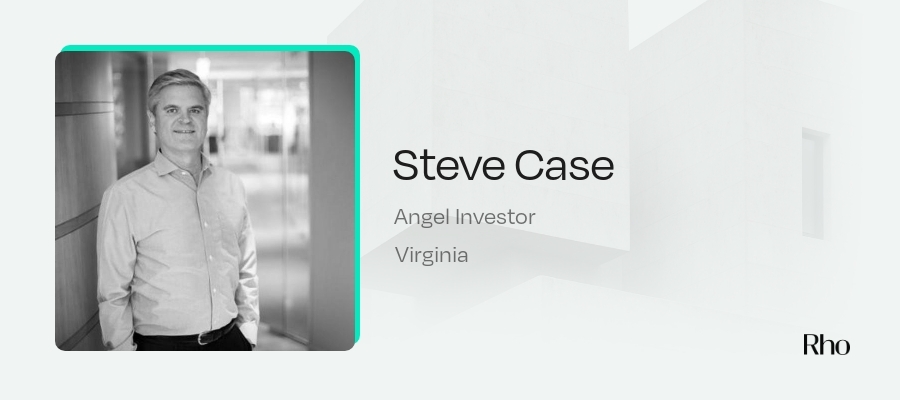
Steve Case is the Chairman and CEO of Revolution, a Washington, D.C.-based investment firm. He is widely known as the co-founder of AOL and has a long history of investing in and advocating for startups across the United States.
Case often invests in companies within the FinTech, Payments, and AI sectors, typically during Seed and Series A rounds. His investments in companies like FiscalNote and FreightWaves show an interest in businesses with the potential for significant market impact.
Founders with early-stage companies in his areas of interest, particularly those based outside of traditional tech hubs, may find him to be a good match. His focus on Seed and Series A rounds makes him a relevant investor for teams seeking initial institutional capital.
- Investment stages: Seed, Series A
- Industries of focus: Payments, FinTech, AI
- Geographical presence: Virginia
- Ideal investment range: $100K - $5.0M
- Notable portfolio companies: FiscalNote, FreightWaves, Class Technologies
You can find more information about Steve Case on his firm's website or his LinkedIn profile.
7. William Ford
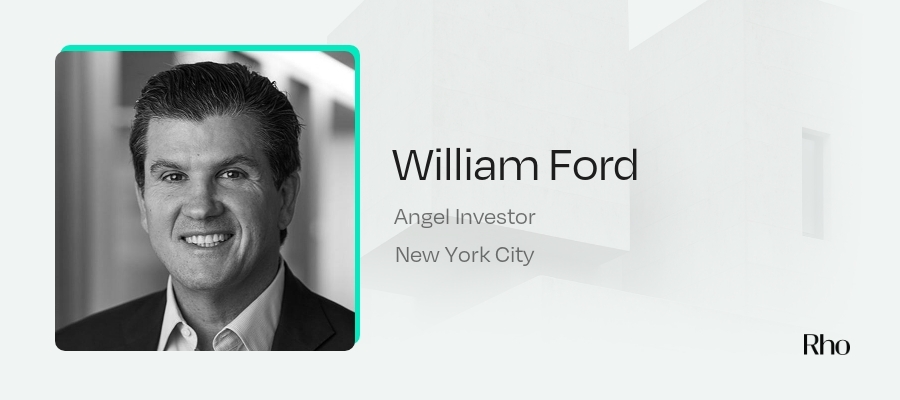
William Ford is the CEO of General Atlantic, a global growth equity firm. He is known for leading investments in established companies across a wide range of industries, from FinTech to retail.
A key aspect of his investment approach is a consistent focus on the Series B stage, where he helps companies scale significantly. His firm's portfolio includes major international players like Reliance Jio, indicating a preference for businesses with proven models and large market opportunities.
Founders with a well-established company preparing for a substantial Series B round may find a good partner in Ford. He is a suitable match for teams seeking significant capital to fuel major expansion and solidify their market position.
- Investment stages: Series B
- Industries of focus: FinTech, Retail, Marketplaces, Health IT
- Geographical presence: New York City
- Ideal investment range: $20.0M - $100.0M
- Notable portfolio companies: Reliance Retail, Reliance Jio, IHS Markit
You can find more information about William Ford on his firm's website or his LinkedIn profile.
8. Patrick Grady
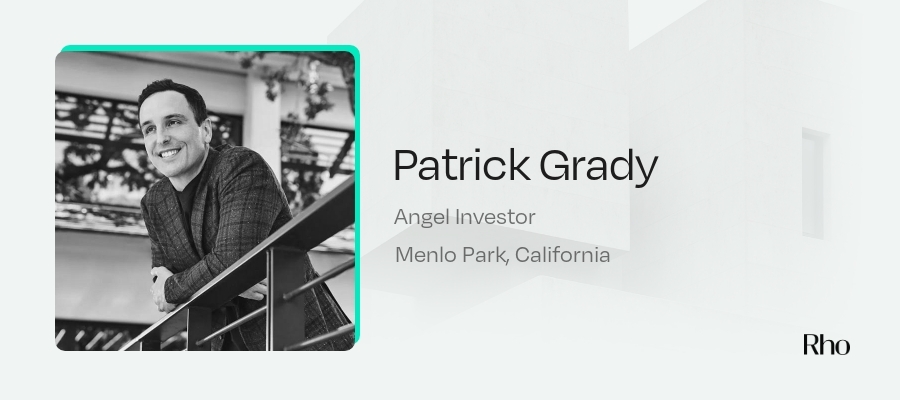
Patrick Grady is a partner at Sequoia Capital, where he works with companies across several technology sectors. His experience includes a focus on businesses in areas like FinTech, AI, and enterprise software.
Grady concentrates on Series B funding, suggesting he engages with companies that have already found their footing and are ready for major growth. His portfolio, which includes companies like Hugging Face and Amplitude, points to an interest in businesses with strong technical foundations and large market potential.
Founders with an established company in the AI, enterprise, or FinTech space seeking a significant Series B round could find a good partner in Grady. He appears to be a match for teams looking for capital and expertise to scale their operations significantly.
- Investment stages: Series B
- Industries of focus: Cloud Infrastructure, FinTech, Generative Tech/AI, Enterprise, Consumer Internet
- Geographical presence: Menlo Park, California
- Ideal investment range: $10.0M - $200.0M
- Notable portfolio companies: Hugging Face, Amplitude, Pilot, Cribl
You can find more information about Patrick Grady on his firm's website or his LinkedIn profile.
9. Ryan Sweeney
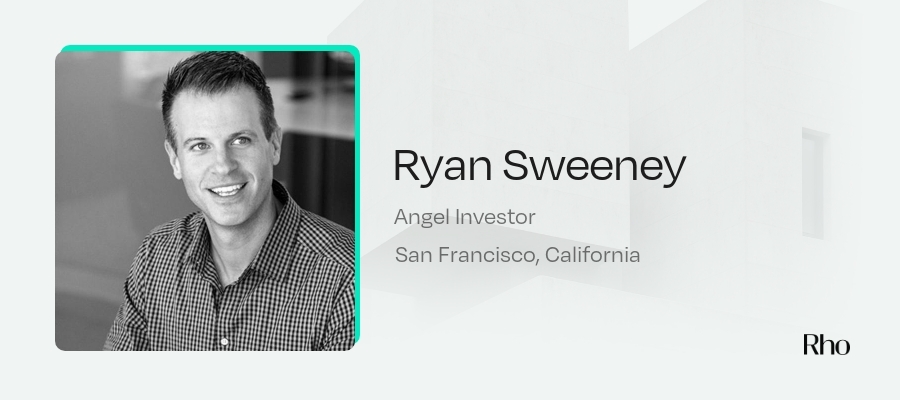
Ryan Sweeney is a partner at the venture capital firm Accel, where he focuses on high-growth technology companies. He is known for his investments in sectors like FinTech, SaaS, and cloud infrastructure.
Sweeney invests across multiple stages, from seed to Series B, with a typical investment sweet spot around $25M. His portfolio includes companies like Gopuff and BrowserStack, indicating a focus on businesses with proven models and significant scaling potential.
Founders with an established business in FinTech or enterprise software seeking a substantial funding round may find a good fit with Sweeney. He appears to be a match for teams that are ready to accelerate growth and expand their market presence.
- Investment stages: Seed, Series A, Series B
- Industries of focus: FinTech, SaaS, Cloud Infrastructure, Payments
- Geographical presence: San Francisco, California
- Ideal investment range: $15.0M - $70.0M
- Notable portfolio companies: Gopuff, BrowserStack, Xendit, Teya
You can find more information about Ryan Sweeney on the Accel website or his Twitter profile.
10. Anton Levy

Anton Levy is a key figure at General Atlantic, where he serves as co-president and chairman of the firm's global technology group. He is known for backing high-growth companies across the technology spectrum, with a particular interest in FinTech, enterprise software, and consumer internet businesses.
A notable characteristic of his investment approach is the combination of early-stage involvement (Seed and Series A) with a substantial investment size, often starting at $20M. His portfolio, which includes companies like Squarespace and Bolt, shows a pattern of backing businesses with strong market traction and significant scaling potential.
Founders with ambitious, capital-intensive businesses in the FinTech, enterprise, or consumer tech sectors may find a good partner in Levy. He is a suitable match for teams that have a clear path to large-scale growth and are seeking a significant capital partner for their early rounds.
- Investment stages: Seed, Series A
- Industries of focus: FinTech, Enterprise, Digital Health, Consumer Internet
- Geographical presence: New York, New York
- Ideal investment range: $20.0M - $100.0M
- Notable portfolio companies: Squarespace, Bolt, HiBob, Chronosphere
You can find more information about Anton Levy on his firm's website or his LinkedIn profile.
11. Alfred Lin

Alfred Lin is a partner at Sequoia Capital with a notable background as an operator. Before his time at Sequoia, he held key leadership roles at companies like Zappos.com, where he was Chairman and COO, and LinkExchange.
His investment activity is concentrated in the Seed and Series A stages across a broad range of industries, including FinTech, enterprise software, and retail. His extensive operational experience suggests he provides more than just capital, offering practical guidance to founders navigating early growth.
Lin could be an excellent match for early-stage founders who value an investor with deep, hands-on experience building and scaling companies. His portfolio, which includes companies like Kalshi and Summer Health, reflects his interest in businesses with strong foundational ideas.
- Investment stages: Seed, Series A
- Industries of focus: FinTech, Enterprise, Retail, Fashion, Local Services
- Geographical presence: San Francisco Bay Area
- Ideal investment range: $1.0M - $10.0M
- Notable portfolio companies: Kalshi, Summer Health, Finch Legal
You can find more information about Alfred Lin on the Sequoia Capital website or his LinkedIn profile.
12. Mike Volpi
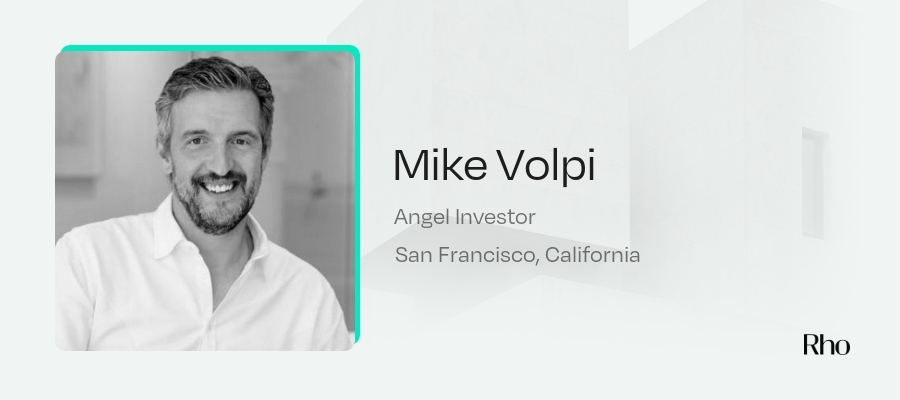
Mike Volpi is a partner at Index Ventures, where he invests across a broad spectrum of technology sectors. His portfolio shows activity in areas ranging from cloud infrastructure and AI to entertainment and retail.
He demonstrates versatility by investing across Seed, Series A, and Series B rounds, with a typical investment sweet spot around $1M. His backing of companies like Kong and Temporal Technologies points to an interest in businesses building foundational technology and infrastructure.
Founders with companies in areas like cloud services, AI, or data may find a good partner in Volpi. He could be a particularly good match for teams at the seed or Series A stage looking for an investor with a wide-ranging technical focus.
- Investment stages: Seed, Series A, Series B
- Industries of focus: Cloud Infrastructure, FinTech, AI, Security, Data Services, Retail
- Geographical presence: San Francisco, California
- Ideal investment range: $100K - $2.0M
- Notable portfolio companies: Kong, Temporal Technologies, incident.io, LiveKit
You can find more information about Mike Volpi on the Index Ventures website or his LinkedIn profile.
What Startup Founders Should Look for in a FinTech Investor
When seeking a FinTech angel investor, it's important to look beyond the capital they provide. The right partner will bring relevant industry experience and a network that can help your startup grow. As the profiles above indicate, many investors specialize in FinTech alongside related sectors like SaaS, AI, and enterprise software, so alignment on vision is key.
Geographical patterns also emerge, with many investors based in hubs like the San Francisco Bay Area and New York. However, their preferred investment stages can vary significantly, from early seed rounds to larger Series B commitments. Targeting investors who match your company's current funding stage is a critical step.
Before you begin outreach, research each investor's portfolio to understand their typical check size and the types of companies they support. A strategic approach to finding angel investors involves identifying individuals whose expertise is as valuable as their investment. This alignment will form the foundation of a strong, productive partnership.
Raise Confidently with Rho
Fundraising requires significant time and energy, making a focused list of relevant angel investors invaluable. It allows you to concentrate your efforts on the connections most likely to be a good fit for your company.
If you’ve just raised, Rho can help you set up your financial stack in minutes. We provide business banking, corporate cards, and bill pay solutions built to help startups manage their new capital efficiently.
This allows you to direct your angel investment toward growth and operations. You can spend less time on manual financial admin and more on building your business.
FAQs about FinTech Angel Investors
What is the difference between an angel investor and an angel group?
An angel investor is an individual who invests their own money. An angel group is a formal organization of multiple investors who pool capital and expertise, often sharing the due diligence process for investments.
What materials should I prepare for a FinTech angel investor?
You should have a concise pitch deck explaining your business model, market, and team. Also prepare a clear financial model showing your projections and how you plan to use the capital to achieve key early-stage milestones.
Are there FinTech angel investors outside of New York and Silicon Valley?
Yes, while major hubs are prominent, FinTech investors are active across the country. Cities like Boston, Austin, and Chicago have growing ecosystems with investors interested in financial technology and related sectors.
Do FinTech angels invest in B2B SaaS companies?
Yes, many FinTech investors also have a strong interest in B2B SaaS. The sectors often overlap, especially for companies providing financial tools, analytics, or infrastructure to other B2B companies.
How much equity do FinTech angel investors typically take?
Equity stakes vary based on your company's valuation and the investment size. For a seed round, it is common for an angel or group of angels to take between 10% and 20% of the company in exchange for capital.
How can I manage my finances after securing angel investment?
After fundraising, it's crucial to manage your new capital effectively. A unified platform can help. Rho offers banking, corporate cards, and expense management to help you put your investment to work for growth.